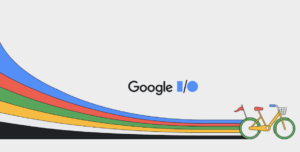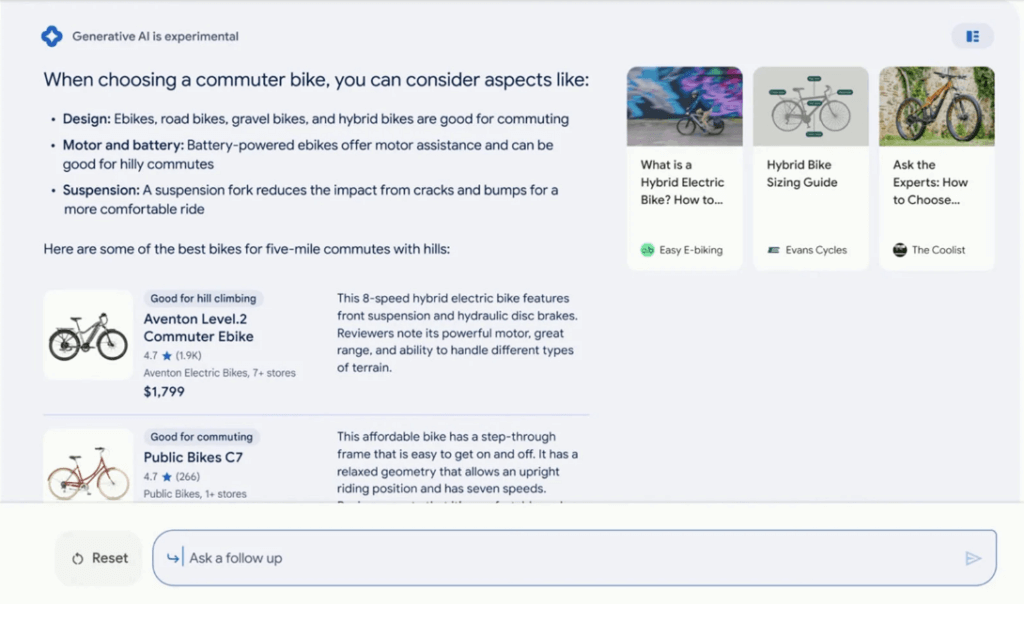 Recent announcements at the Google I/O 2023 event have signaled a profound shift in how search engines will function. The introduction of generative AI in search, AI-powered snapshots, and enhanced understanding of complex queries provide a glimpse into the future of search engine technology.
Recent announcements at the Google I/O 2023 event have signaled a profound shift in how search engines will function. The introduction of generative AI in search, AI-powered snapshots, and enhanced understanding of complex queries provide a glimpse into the future of search engine technology.
Let’s dive into the details of these innovations and understand their potential impact on SEO. Any businesses using AI Text Generators or Image Generators will need to pay attention to what Google is working on.
Unraveling Google’s AI-Powered Snapshot
Google has launched a new feature, the AI-Powered Snapshot, which presents an AI-generated summary of vital details and relevant links in response to a search query. Additionally, the snapshot suggests follow-up questions and recommended actions, leading users to a conversational interface for further exploration.
The objective is to enable users to thoroughly explore a topic without having to sift through multiple pages. You can see an early preview of how this will look below:

Implications for SEO
With this shift in SERP (Search Engine Results Page) content presentation the emphasis is now on creating user-focused content that offers high-quality information to meet the needs of searchers.
SEO professionals will need to prioritize creating content that provides a comprehensive understanding of the topic at hand. This change could potentially impact click-through rates, as users will find most of the information they need directly on the search results page.
Generative AI: Creating Original Answers
In a significant departure from the traditional featured snippet system, Google will now utilize generative AI to create original answers for specific queries. Instead of sourcing information from existing websites, Google’s AI will generate unique answers based on the user’s query.
Think of this like using ChatGPT, where rather than looking through a list of potential sites the answer is provided right away. Whether Google’s AI answers will be better and more trustworthy than ChatGPT remains to be seen.
SEO in the Age of Generative AI
While this development could reduce the number of clicks to a website for certain queries, it underlines the importance of high-quality, user-focused content. Google will still value websites that provide accurate and up-to-date information and will cite such content as the source for generating its original answers.
As a result, websites with superior content can expect to be rewarded with higher rankings in search results. See our review of the best AI Writing Tools to make sure your automated content platform is best in class.
Understanding Complex Questions: A Leap Forward
Google’s new search capabilities now take into account the semantic and contextual nuances while answering queries. This means that Google can comprehend the intent behind longer and more complex questions better, providing more accurate and comprehensive results.
The hope is that in the end, searchers win by getting faster and more accurate results from Google. But it will be a war for content sites to be included as a reference source for high value keywords.
The New SEO Strategy: Beyond Keywords
This shift towards a more semantic and contextual search approach changes the SEO landscape. SEO strategies that solely rely on keywords might become less effective.
Content creators will need to focus on creating comprehensive and authoritative content around specific topics. By creating topic clusters through interlinked content pieces that cover a broad topic in-depth, websites can establish authority in a specific topic area and increase their chances of ranking higher in search results.
Frequently Asked Questions (FAQ)
What is Google’s AI-powered Snapshot?
Google’s AI-powered Snapshot is a new feature that presents an AI-generated summary of crucial details and relevant links when a user enters a search query.
How will Generative AI impact SEO?
Generative AI will create original answers for specific queries, which might lead to fewer clicks to a website. However, Google will still value and reward websites that provide high-quality, user-focused content.
How does Google’s new search capability handle complex questions?
Google’s new search capabilities can understand the intent behind longer and more complex questions, providing more accurate and comprehensive results. This involves taking into account semantic and contextual nuances when answering queries.
How should SEO strategies evolve in light of these changes?
SEO strategies should move beyond focusing solely on keywords. Instead, they should aim to create comprehensive, authoritative content around specific topics. This can be achieved by creating topic clusters through a set of interlinked content pieces that cover a broad topic in-depth, establishing authority in a specific topic area and improving the chances of ranking higher in search results.
Conclusion
The world of SEO is about to experience a significant shift with Google’s latest AI search innovations. While the path ahead may seem challenging, it presents exciting opportunities for those willing to adapt and evolve. By keeping user needs at the forefront and focusing on creating high-quality, comprehensive content, businesses can stay ahead in the ever-evolving SEO landscape.
